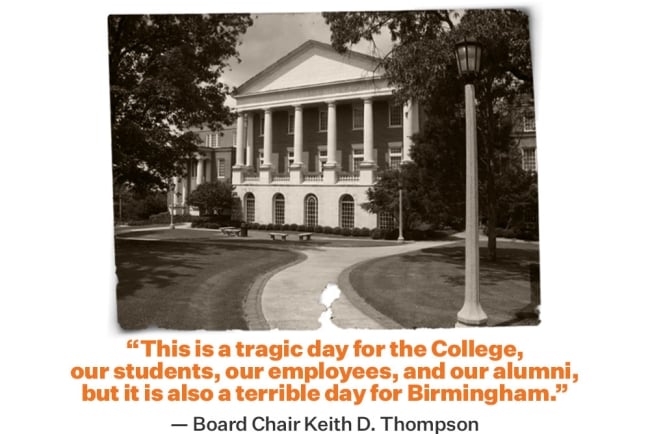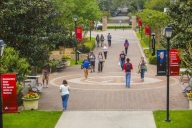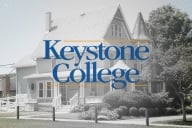You have /5 articles left.
Sign up for a free account or log in.

Birmingham-Southern College will close in May due to serious financial distress.
Photo illustration by Justin Morrison/Inside Higher Ed | Jwrandolph/WikimediaCommons
After a year-and-a-half of uncertainty, Birmingham-Southern College will close in May.
College officials announced the decision on Tuesday, citing steep financial difficulties and the failed revision of a state loan program created to provide a lifeline for the institution.
Lawmakers sought to save Birmingham-Southern last year by passing legislation to establish an unusual loan program for private colleges. But State Treasurer Young Boozer III—who was responsible for administering the loan—denied BSC’s application last fall, arguing in a statement that the college “did not meet the collateral requirement in the statutory minimum requirements,” and therefore represented a “terrible credit risk.” Jabo Waggoner, the BSC graduate and state lawmaker who authored the legislation to save his alma mater, sought to revise his bill this year to minimize Boozer’s role in approving the loan.
However, with the legislation expected to face an uphill battle, college officials pulled the plug before the bill reached a final vote.
A Sudden Closure
After 168 years in business, Birmingham-Southern is suddenly in its last semester. The Board of Trustees voted unanimously Tuesday to close the institution on May 31.
“This is a tragic day for the College, our students, our employees, and our alumni. But it is also a terrible day for Birmingham, for the neighborhoods who have surrounded our campus for more than 100 years, and for Alabama,” Board of Trustees Chair, Keith D. Thompson, said in a news release.
In making their case to lawmakers, BSC officials often pointed to the college’s economic benefit to the city and state. On Tuesday they cited an annual impact of $90 million for Alabama and $68 million for Birmingham. But that argument was apparently not enough to sway lawmakers to make a slight tweak to the existing law written by Waggoner that would have likely resulted in a $30 million loan for the college.
To officials, the loss of BSC is about more than money; Thompson calling it “incalculable.”
Birmingham-Southern President Daniel B. Coleman said in the press release that the college had exhausted every option to obtain the loan, including filing an unsuccessful lawsuit to force Boozer to disburse the loan, which was dismissed last fall.
Birmingham Mayor Randall Woodfin called the closure “heartbreaking” in his own statement while thanking leaders for their efforts to keep BSC open.
Financial Missteps
A look at Birmingham-Southern’s finances reveals the challenges it faced.
Publicly available financial documents show that the college has operated at a deficit for eight of the last 10 fiscal years. At the same time, Birmingham-Southern’s enrollment has slipped from more than 1,500 students in fall 2010, according to federal data, to 731 last fall, according to numbers the college listed in legal documents.
Serious missteps by past administrations have also contributed to the closure.
In 2010, a major financial aid error was discovered in which BSC incorrectly calculated Pell Grant awards, overpaying by millions. Steep budget cuts and significant layoffs soon followed, and the college faced a revolving door of presidents. Coleman, who was hired in 2018, is the fourth full-time president at BSC since 2010.
The college also depleted its endowment, tapping the funds for building projects and other needs. In Tuesday's press release, Coleman noted that when he took office in 2018, the college had a history of drawing heavily on its endowment to cover operating losses. Once valued at more than $110 million, BSC’s endowment withered to roughly $51 million by fiscal year 2022.
After years of serious operational issues, Birmingham-Southern warned in December 2022 that it could close in May 2023, citing more than a decade of financial stress. The college managed to hold on a year longer than its own anticipated expiration date, raising money from donors and making a push in the Alabama legislature for a state loan. But public officials turned out not to be the small Christian college’s salvation, as the last hope for a state loan vanished in the legislature.
In recent months, Boozer has sought to publicly absolve himself of blame for a potential closure, pointing to enrollment trends and BSC’s history of financial missteps.
“After MANY hours of thoroughly reviewing and investigating the information provided by Birmingham-Southern, I stand by my decision to deny using Alabama taxpayer dollars for a loan to an institution which I believe has been grossly mismanaged for many years. It is beyond distressed,” Boozer wrote in an opinion piece for the conservative state website Yellowhammer News last month.
Waggoner did not respond to a request for comment from Inside Higher Ed on Tuesday, but questioned Boozer’s rationale for denying the loan in an opinion piece on the conservative website 1819 News.
“When we crafted the 2023 legislation, and when members voted overwhelmingly for it, we did not intend for any applying institution to be denied the loan based on an illogical interpretation of the statute. We believe the Alabama Legislature intended to ensure the prompt issuance of loans to eligible colleges or universities to address their financial hardship before they become fatal,” Waggoner wrote.
Alabama Representative Terri Sewell, a Democrat, also chastised state lawmakers over the closure in a statement posted to social media on Tuesday.
“While no one had hoped for this outcome, the failure of state leaders to do their part and provide assistance to BSC is particularly disappointing,” Sewell wrote. “It remains my belief that the cost of such an investment would be small relative to the tremendous benefits of keeping the college open.”
What happens next for employees and students—who received the news while on spring break—is unclear. BSC noted in the press release it has begun planning to help students with transfer opportunities, but their scholarships will not necessarily follow them.








